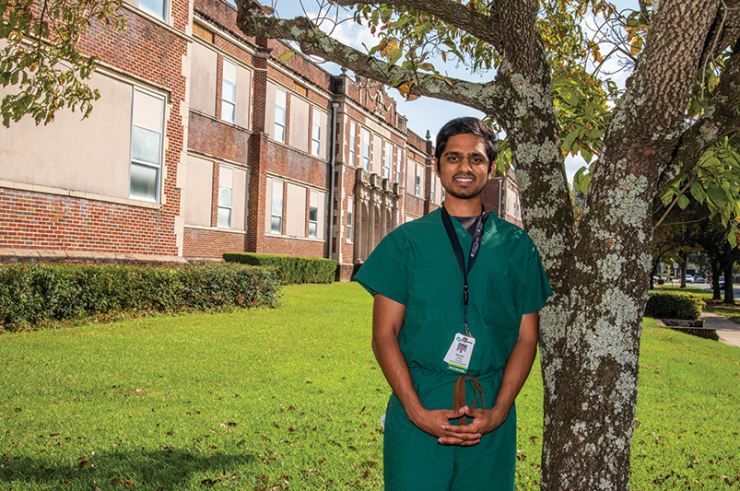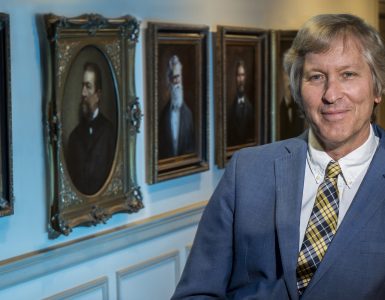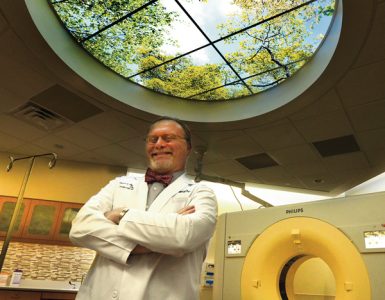Alumni Weekend 2020 was canceled due to the COVID-19 pandemic. These distinguished alums will be honored during Alumni Weekend 2021.
Dr. Koosh Desai
Dr. Koosh Desai, a 2016 graduate and an internist at Phoebe Putney Memorial Hospital in Albany, is the 2020 Distinguished Young Alum for the Medical College of Georgia.
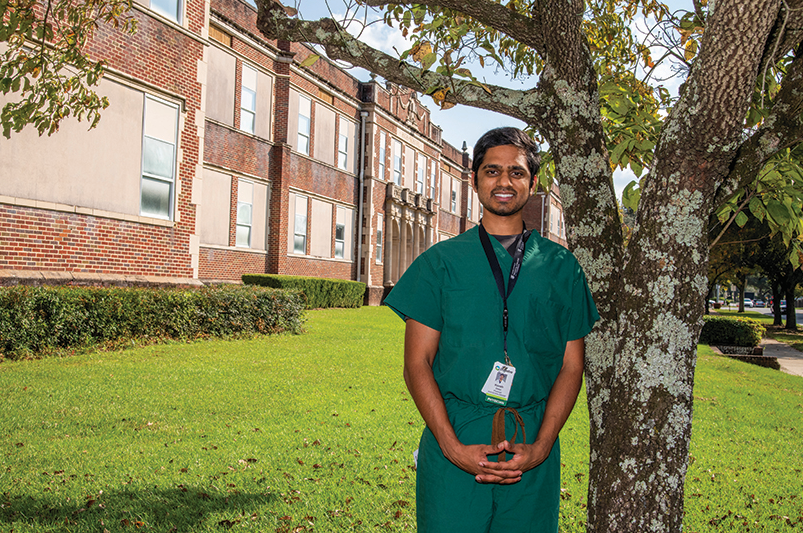
Desai, who spent his clinically intensive third and fourth years of medical school at the MCG Southwest Campus, based in Albany, returned to the campus in 2019 as faculty to help build out a new curriculum that the medical school hopes will produce more primary care physicians for Georgia.
In his new faculty role as longitudinal integrated curriculum director, Desai is working with the very physicians who mentored him and others to build a new learning experience for students. An LIC eliminates the traditional, short “block rotations.” Instead, students learn the core skills of doctoring by following a large panel of patients longitudinally, over substantial time. Students see patients through all phases of diagnosis and treatment, including hospitalizations, discharge follow up and even home visits. The approach traditionally produces more primary care physicians.
In addition to creating more doctors for Southwest Georgia, Desai is also working to improve health outcomes in underserved areas across the state.
While completing his residency at MCG, he co-founded the Georgia Colon Cancer Prevention Project, which has him partnering with a select group of Georgia’s Federally Qualified Health Centers to improve colorectal cancer screening.
He wants to help by offering FQHCs an affordable alternative to expensive colonoscopies, called a fecal immunochemical test, or FIT. This screening tool tests for hidden blood in a stool sample, which can be an early sign of cancer. FIT tests have proven to be as accurate as colonoscopy in most people without a family history and/or history of polyps, and they have the approval of the American Cancer Society and the American College of Gastroenterology, Desai says.
He has partnered with Hemosure, which manufactures FIT tests, to offer them to FQHCs for around $7 per test. The typical market price for the tests is around $20. Desai says many FQHC’s weren’t offering FIT tests because of a lack of knowledge surrounding the alternative to colonoscopy.
To date, the Georgia Colon Cancer Prevention Project has partnered with five FQHCs, which together serve over 90,000 patients each year. They have educated over 150 health care providers, and early data shows that there’s already been a 10% increase in screening.
Desai was also part of the team that helped secure a $3.9 million grant from the Centers for Disease Control and Prevention to establish the Georgia Colorectal Cancer Control Program, aimed at further increasing screening in underserved areas of the state. He was named the program’s regional medical director in Southwest Georgia.
As an internist at Phoebe, Desai was part of the frontline team when Albany became a COVID-19 hotspot in March and April. He now spends his free time working as a COVID surge doctor, responding when other health systems in Georgia become overwhelmed with cases.
Dr. Sam Richwine
Dr. Sam Richwine came to the Medical College of Georgia as a student in 1973.
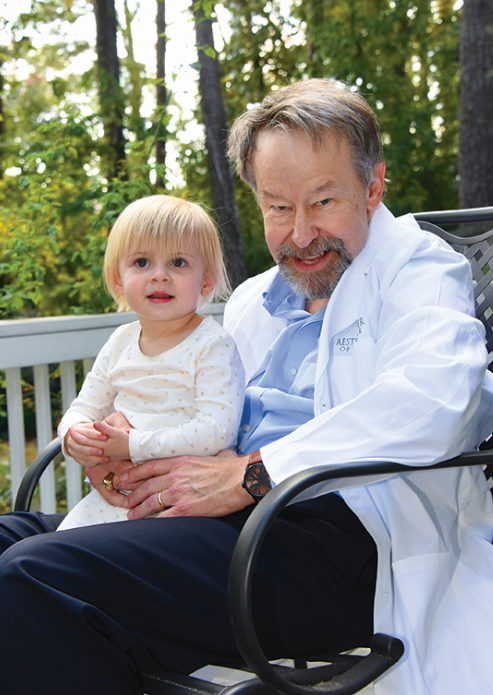
He’s never really left.
Richwine earned his MD in 1977, started his surgery residency that summer and finished his plastic surgery training in 1984.
He came back to his alma mater to help train surgery residents in Augusta, while maintaining his busy practice in Gainesville.
He served the MCG Alumni Association for five years, including a year as president from 2013-14; and the MCG Foundation Board for seven years, two as board chair.
Richwine is the 2020 MCG Distinguished Alumnus for Loyalty, an honor he says he’s doesn’t feel worthy of receiving.
“(They) sent me the list of people who have won distinguished alumni awards and I don’t have any business being on the page with half of those people,” Richwine, who is still a clinical professor at MCG, says. “They are truly giants in the field of medicine, certainly to the alumni association, the foundation and overall dedication to the school. I’m such a Johnny Come Lately,” he says in his typical self-effacing manner.
You have to peel the onion
As a sophomore at the University of Georgia, a young Richwine hadn’t decided exactly what he wanted to be. He’d grown up the son of a nurse and had an early interest in health care, but at UGA he’d pursued journalism, after serving as the yearbook photo editor and editor of the school newspaper in high school.
Career testing at the university’s counseling center took inventory of his “likes and dislikes and his capabilities and non-capabilities” and suggested he’d do better in medicine than journalism. So he quickly switched his schedule, adding the pre-requisite science courses with an eye toward applying to medical school. “There was no turning back at that point,” he says.
He applied and interviewed at MCG and Emory University School of Medicine. At his rather “rigid” interview at Emory, when asked what he’d do if he didn’t get in, Richwine laughed and patted his pocket and told them “No problem here! I’ve already been accepted to one medical school (MCG),” he remembers laughing.
He got into Emory too, but with yearly tuition a little over $5,000 — vs. around $1,800 a year at MCG — “That wasn’t a long discussion in the Richwine Household.”
At the state’s only public medical school Richwine found a class that was more like a big family, he says. They studied hard, but found time to get together with classmates and their families after hours too. When he began considering where he’d like to pursue his surgery residency, he says there was never really any other choice.
“MCG has always had the reputation of turning out good clinical doctors. When an MCG kid walks on a ward, they know that he or she has a pretty good idea of what they’re supposed to be doing and that extends to the residency programs too,” he says.
And he’d be able to train under MCG surgery greats like the late Dr. Arlie R. Mansberger Jr., professor emeritus and longtime chair of surgery, who had helped start the nation’s first trauma center at the University of Maryland, and helped MCG and its teaching hospital’s start the state’s first designated trauma center; like Dr. Talmadge “Joe” Bowden, ’66, professor emeritus and longtime chief of the Section of Gastrointestinal Surgery; and like Dr. Charles Wray, ’59, a vascular surgeon and vice president emeritus for clinical activities and professor emeritus of surgery.
“Anyone can present someone with a list of symptoms and most doctors can figure out how to treat it,” Richwine says “But these guys always taught me that while that was the initial step, when you really get down to it, you have to peel the onion — you may not do for an 84-year-old patient what you do for a 54-year-old. They taught me the importance of working with the entire picture.”
Staying connected
Richwine’s surgery intern year, coincided with Dr. Kenna Given’s arrival at MCG as chief of the Section of Plastic and Reconstructive Surgery. Richwine had developed an early interest in the surgical subspecialty and asked Given if he could spend extra time rotating through his section.
After the first month, he was hooked, fascinated by the artistry and work of other senior residents like the late Dr. Randy Smith, an Augusta plastic surgeon and 1970 MCG graduate, and their ability to repair defects, like hand trauma for instance, making it look like nothing had ever happened.
So much so that after his first year of residency, Richwine approached Given again. “This was before they even did a match for plastics,” he says. “I went to him and said ‘Dr. Given, do you think you might find a slot in your training program for a graduating general surgery resident in about five years?’”
Richwine finished his plastic surgery training at MCG in 1984. “I always tell my kids that I came in the Fall of 1973 and didn’t leave until the Spring of 1984, because I was a slow learner. By the time I did leave, I think I was the title holder of the longest continuous Augusta resident (among his classmates).”
Richwine left Augusta for Gainesville, about an hour north of Atlanta, and joined Northeast Georgia Plastic Surgery Associates, a private practice. But when Augusta and MCG needed him, he didn’t hesitate to head back south.
“I found out that not long after I finished my training that most of Dr. Given’s faculty had left,” Richwine remembers. “He was trying to run the department, do the administrative work and run the residency program. I volunteered to help. I used to head out of Gainesville in the middle of the night, get there in the morning, head to the OR and do cases with residents. When the day was over, I’d peel off my scrubs and head back north.”
Training the next generation
Those early days teaching residents may have been what first prompted Richwine to maintain a connection to his alma mater — but that desire only strengthened when his daughter, Dr. Betsy Richwine (Bolton) enrolled at MCG in 2002. She is now dermatologist in the Atlanta area.
Richwine’s commitment to MCG has continued.
In addition to his service to the alumni association and foundation, Richwine’s practice also helps train MCG students.
“They say plastic surgeons treat the skin and everything within its contents. It’s a very broad practice,” he says. “We’re in a small place (in Gainesville), so we do whatever walks in the door. Students see that we treat things like skin cancers and hand trauma. They are amazed at the breadth of what we do here. I hope we can help (MCG) continue the tradition of great clinical faculty that produce great clinical doctors, and that we can keep these kids in the state.”
In 2016, Dr. Betsy Richwine established the Samuel W. Richwine Jr., MD Lectureship in Surgery, to honor her father and enable the MCG Department of Surgery to bring in internationally renowned speakers. To donate, visit mcgfoundation.org/give-now. In “Please select a fund to support” specify “other,” then enter the name of the lectureship in the comments box OR mail a check payable to Samuel W. Richwine Jr., MD Lectureship in Surgery to the MCG Foundation, 720 St. Sebastian Way, Suite 150, Augusta, GA 30901.
Dr. Phillip Roberts
When Dr. Phillip Roberts arrived in Albany from Boston in 1980, the hematologist and 1962 Medical College of Georgia graduate set up shop in a rented 900-square-foot office. He used the $25,000 he’d made on a recent real estate sale to buy the equipment he’d need, like exam tables.
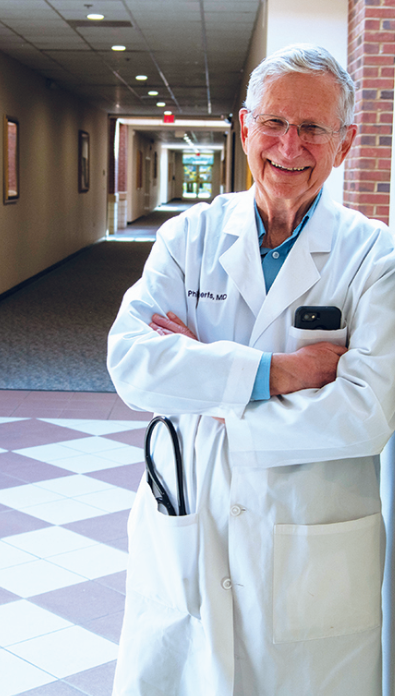
At the time, he was the only physician in Albany with experience treating blood cancers like leukemia and lymphoma. The next closest was in Macon, a hundred miles away.
Roberts’ small practice, where he treated patients day-in and day-out while his wife Priscilla maintained the books, haggled with insurance and made patient appointments, planted some of the first seeds of cancer care in that part of Southwest Georgia.
In the four decades since, those seeds have grown into what is now the Phoebe Cancer Center at Phoebe Putney Memorial Hospital. Instead of 900 square-feet of office space, cancer care occupies its own tower outside of the main hospital. It boasts some 25 treatment rooms, 40 infusion chemotherapy stations, expanded labs and a pharmacy. Thirteen oncologists treat a wide variety of cancers — from breast to colon, from lung to ovarian and prostate, from Non-Hodgkin’s lymphoma to multiple myeloma.
“In Boston, who cared if I left? I was one of hundreds of doctors,” Roberts, the 2020 MCG Distinguished Alumnus for Professional Achievement, remembers. “But here, I knew I could make a difference in someone’s life.”
Somewhere he could do the most good
Roberts’ parents were originally from Seminole County, Georgia, but had moved to Alexandria, Virginia before he was born. He found his way back south to attend the University of Georgia, where he met and fell in love with Priscilla, who was from Cartersville, Georgia. They married and had three sons.
After graduating from MCG, he headed to Spartanburg, South Carolina for his internship year but then the United States Army came calling. Under the Berry Plan, during the Vietnam War, physicians could defer obligatory military service until they had completed medical school and residency training. Roberts went to El Paso, Texas, where he completed his internal medicine residency at William Beaumont Army Medical Center.
Then it was time to pay the Army back.
The couple spent three years at Aberdeen Proving Ground, an army base in Aberdeen, Maryland, before heading to Boston City Hospital for Roberts to complete a hematology fellowship. (Oncology did not become a board-certified specialty until 1972.)
They stayed there for eight more years, but he quickly began to realize that every hematology practice there was affiliated with one of three major universities — Tufts, Harvard or Boston University. “Everything you did had an umbilical cord going back to one of those places,” he says. “I wanted my own program.”
Roberts began considering a move back to Georgia, where both he and Priscilla still had family and where he felt establishing a hematology practice could do the most good. “Back in 1980, there were few hematologists in Georgia,” he remembers. “They were in Augusta and Atlanta and there was one in Macon and maybe one in Columbus. We could have gone anywhere. Then we looked at the map and Albany was the most isolated metropolitan area in the state. I knew the need would be great here. That’s why I came here.”
They opened the tiny practice and got to work. The practice thrived and he was able to hire a nurse and more staff and eventually took on other hematologists as partners. Roberts also established clinics in nearby Americus, Tifton, Moultrie and Cordele, to keep patients from having to travel to Albany.
His wife Priscilla left their practice in 1990 and he began to consider a full-time move to smaller, slower-paced Tifton. He went to speak to former Phoebe CEO Joel Wernick about it. Not wanting to lose the area’s only cancer program, Wernick arranged for the health system to take over Roberts’ practice — bringing in people to manage the day-to-day and paying Roberts a salary as the new cancer center’s director.
He retired from that job for the first time in 2014. “I told Joel I was going to retire when I was 80. I went back several times, though,” he says laughing.
You become invested in people
Roberts says it’s the people that have made it hard to put his medical career in the rearview — and in a sense, he hasn’t.
“They become part of your life. They’re still part of my life,” he says. “I could spend a whole day just talking about patients.”
He remembers many of them vividly, even now.
Like the 8-year-old boy with hemophilia who’s adoptive mother died while he was being treated. He developed Hepatitis C as a complication, but there was no treatment at the time. The young boy eventually went to college but found himself in credit card debt and reached out to Roberts to tell him he was going to quit school. Roberts wouldn’t have it.
He helped the boy pay his monthly college expenses so he could work to pay off his debt. Then, while working as an architect, the boy — by then a man — developed liver failure. He reached out to Roberts again, who helped him get into the transplant program at the University of Alabama at Birmingham. He got a new liver and now runs marathons.
Like the high school girl with Hodgkin’s lymphoma they treated, who eventually relapsed. “In the old days that was the kiss of death,” Roberts remembers. “Today, the treatment would be a bone marrow transplant, but there were no bone marrow transplants then.” Roberts and his colleagues did what they could and blasted the spot with radiation. She was cured and later became an oncology nurse.
Like the seven-year-old boy he was asked to consult on because there was no pediatric hematologist in town. He was diagnosed with acute leukemia and Roberts sent him to St. Jude Children’s Research Hospital in Memphis. They developed a treatment plan and would send Roberts the chemotherapy to administer under their protocols. “Back then there was no such thing as a port for chemo,” Roberts says. “He got tired of being stuck every time. He would bite and spit and one day we were holding him down and he broke loose. He ran out the door and my wife was chasing him through the parking lot.” That little boy is in his 40s now and still calls Roberts regularly.
“You wouldn’t have those relationships in a bigger area,” Roberts says. “You know these people and their families.”
Meeting an unmet need
In April 2020 Roberts had decided to “fully retire” from Phoebe. “I just decided that was it.”
Except it really wasn’t.
For the last several years, Roberts has run an adult medical clinic out of the Dougherty County Public Health Department. Two days a week, he, two nurses and two secretaries open up the clinic to people who are uninsured and have no access to any other primary care.
They help them manage chronic illness like high blood pressure, diabetes, heart and pulmonary diseases. The more than 100 patients a month they see come from a variety of backgrounds — some of them are just out of jail, some are in drug and alcohol rehab programs. “But the majority of them are just people in town,” Roberts says. “There are a lot of mothers, grandmothers and grandfathers who need care and don’t have any source for it.”
Roberts and the staff help those people get much needed medications for free or at a drastically reduced price. They help them stay on top of vaccines and annual screenings like mammograms and colonoscopies. They help them navigate the financial assistance programs at area hospitals.
“We keep people out of the emergency room, which saves the health system money,” Roberts says. “By keeping their chronic conditions under control, they also have better quality of life.”
Roberts says the clinic is a fine-tuned system that wouldn’t work without partnership between the hospitals, pharmaceutical companies and local pharmacies who help find prescriptions at reduced prices, the clinic’s volunteer staff and the health department that provides the clinic space for free.
“For me, it is and has always been about finding the best way to meet an unmet need,” Roberts says. “If you don’t do it, who will? I intend to do this as long as there is a need.”

